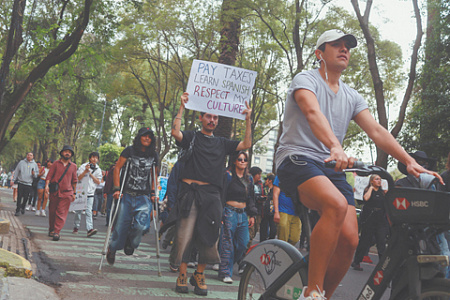
Mexico City authorities are moving to cap soaring rental prices and build new housing, a dramatic policy reversal prompted by a fierce public backlash against the influx of foreign “digital nomads.” Once actively courted, these remote workers, largely from the U.S. and Europe, are now at the center of a crisis over gentrification and affordability that has seen simmering tensions boil over into the streets of the Mexican capital.
Mayor Clara Brugada has announced plans to regulate the housing market, most notably by prohibiting landlords from raising rent beyond the rate of inflation. The initiative, which also includes a pledge to construct more homes, marks a significant departure from the city’s previous strategy of openly encouraging remote workers to relocate, a policy that has been blamed for displacing local residents.
This shift contrasts sharply with the approach under former Mayor Claudia Sheinbaum, now the country’s president, who in 2022 signed a partnership with Airbnb and UNESCO to promote the city as a premier destination for digital nomads. Lured by a relatively low cost of living and a temporary resident visa allowing stays up to four years, thousands of foreigners flocked to the metropolis, working remotely for non-Mexican employers.
While the arrival of well-paid professionals was initially seen as a boon for urban renewal and the local economy, it brought a severe downside. This process of gentrification led to skyrocketing prices for housing and daily goods in popular neighborhoods, effectively pricing out longtime local residents and creating deep-seated resentment between Mexicans and foreign transplants.
The conflict reached a boiling point in early July when hundreds of demonstrators took to the streets. Chanting slogans like “Gringo, stop stealing our home” and demanding that foreigners pay local taxes, the initially peaceful protest turned violent, with some participants smashing storefronts and harassing foreigners.
In response to the unrest, Mayor Brugada’s administration is now seeking a balance, hoping the new regulations can ease the cost-of-living crisis without completely deterring the digital nomads. However, some experts argue that these remote workers are merely a convenient scapegoat for a larger, global issue.
Tatyana Rusakova, a senior researcher at the Institute of Latin America, suggests the root cause is unregulated mass tourism, a phenomenon plaguing cities worldwide from Spain to Italy. “The anger of local residents is completely understandable,” Rusakova explained. “When authorities make a bet on mass tourism without limiting it, gentrification occurs. Since tourists can pay more, landlords have a temptation to raise prices, pushing locals out of popular districts.”
While the government hopes its new measures will restore harmony, the recent violence may have already done lasting damage. For a country grappling with persistent security challenges, the public hostility serves as a stark reminder of the safety risks that could overshadow the city’s perks, potentially making digital nomads think twice before calling Mexico City their temporary home.
